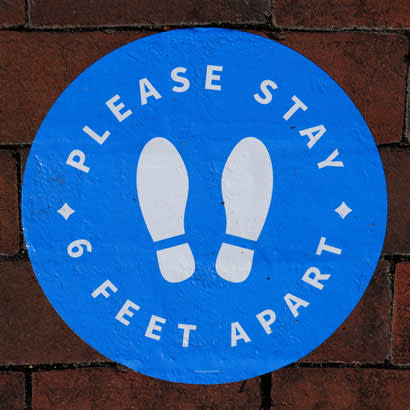
For kids, parks and recreation centers are essential spaces for learning through play (the best way to learn!). And as NRPA reminds us, parks, trails and open spaces are not only safe, but are also the best places to be for our kids’ and our own mental health right now.
Nature makes the best classroom for kids, and spending even a small amount of time outdoors improves health and wellness. And even outside, physical distancing is key to keeping everyone safe.
Tinkergarten supports kids learning in parks and green spaces all over the country with classes and content to inspire parents, caregivers and children to get outdoors, play and learn. But we know that has to be done safely. So, we designed easy ways to teach kids — from babies to elementary schoolers — how to physically distance effectively through a child-development lens and in a way they can understand and implement.
Educators and care providers use metaphors like “personal space bubbles” to help children conceptualize personal space.
When we ask kids to keep a 6-foot space bubble while they play, we’re asking them to add just a bit more space to their personal space bubble. Now, this is not easy since kids' ability to control the impulse to be close to friends does not fully develop until they are in adolescence. So, it will take practice and reminders. And, yes, they will likely forget and need even more reminders. But they can do it.
Here are three easy ways to reinforce a 6-foot distance:
6-Foot Strings
Perhaps the best tool we’ve used to teach kids what 6 feet really is, is the “6-foot string.” Measure out 6 feet of string, then put a little tape on each end to make it durable.
Ask, “What can we do with this string?!” As you play with it, you can talk to kids about physical distance in a really natural way. “You know, this string is 6 feet. This is how much of a bubble we’ve got to give other people.” Though it’s hard for little kids to conceptualize a distance, with enough practice (especially the FUN kind), they can build a physical memory for the distance that they can readily apply in social situations.
6-Foot Grown-Ups
Some adults are actually 6 feet or more from head to toe. For many of us, it just takes adding in our arms to get there. So, you are actually a pretty great tool for showing what 6 feet really is. Just lie down on the ground!
After doing this a few times, remind kids to “keep about a grown-up apart while you play” or “let’s give those (other hikers) a grown-up of space.” Though kids can struggle to know what 6 feet is, they can picture it, and, with practice, they can feel and put to good use what a “grown-up” of space is.
The Lobster Walk
Animals make powerful allies for children. And lobsters can move backward even faster than they move forwards.
To teach kids the lobster walk, start by asking what seems special about lobsters. Say, “I learned something about lobsters that I think is amazing; do you want to hear? Lobsters can move as fast backward as they can move forwards! I know I can’t do that!”
Then, get kids to try it. “Want to try to lobster walk?!” As you pretend to move like lobsters, it’s fun for kids who are really steady on their feet to feel how much harder it is to go fast backward as humans. Don’t forget to add in some pretend claws as you play! (Watch a video here to see the lesson in action).
What are your tips and tricks for helping kids physically distance at 6 feet apart? We’d love to hear from you — share them with us on social media and tag #Tinkergarten in your post!
Tinkergarten is on a mission to elevate childhood. We’re growing a technology-enabled network of leaders that bring families together in a natural place in their community for classes where kids learn through play. Our expert-designed classes and activities help kids ages 6 months—8 years develop core life skills while enjoying healthy, fun, engaging experiences in the physical freedom of local green spaces.
For more expert-designed advice on how kids navigate the world, follow Tinkergarten on Instagram, Facebook and Twitter, and read more on our blog.
Meghan Fitzgerald is the founder of Tinkergarten. After 18 years as an educator, curriculum developer and school leader, Meghan has her dream gig — an entrepreneur/educator/mom who helps families everywhere, including hers, learn outside.

